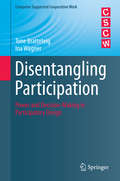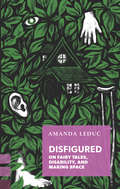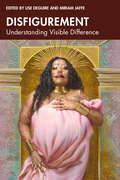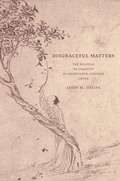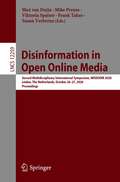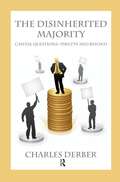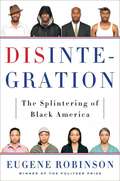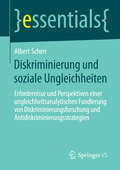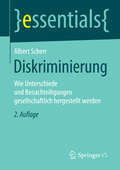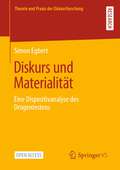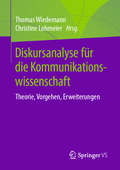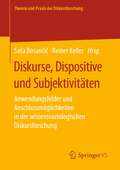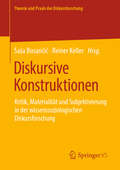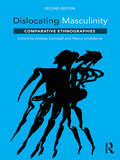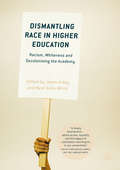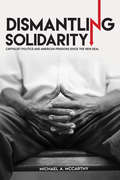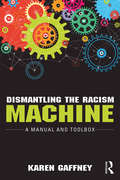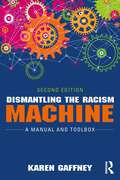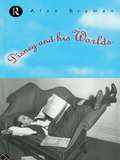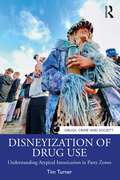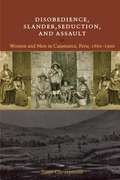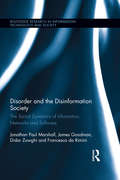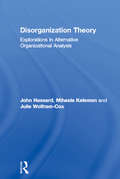- Table View
- List View
Disentangling Participation
by Tone Bratteteig Ina WagnerProviding a critical view on user participation in design, disentangling decision making and power in design, this book uses fieldwork material from two large participatory design projects: one experimental in the field of urban planning, the other a product development project within health care. Addressing power issues in participatory design is critical to providing a realistic view of the possibilities and limitations of participation. Design is decision-making: during a design process a huge number of decisions taken before the designers end up with a design result - an artefact or system. All decisions are a choice between possibilities and selecting one of them and making it concrete as a change in an artefact is a demonstration of the capacity to transform, which is a key aspect of power. Participatory designers are committed to empowering users and facilitating a design process where users are able to take part in all types of decisions. This volume explores the challenges for practitioners of participatory design arising from this commitment by asking what participation really means: who should participate and in which parts of a design process; what does it mean to share power with users; how are decisions to be made in a participatory way and what is it that users participate in? The book provides a conceptual framework for understanding these issues as well as a fresh look at participation.
Disfigured: On Fairy Tales, Disability, and Making Space (Exploded Views)
by Amanda LeducFairy tales shape how we see the world, so what happens when you identify more with the Beast than Beauty? If every disabled character is mocked and mistreated, how does the Beast ever imagine a happily-ever-after? Amanda Leduc looks at fairy tales from the Brothers Grimm to Disney, showing us how they influence our expectations and behaviour and linking the quest for disability rights to new kinds of stories that celebrate difference. "Leduc persuasively illustrates the power of stories to affect reality in this painstakingly researched and provocative study that invites us to consider our favorite folktales from another angle." —Sara Shreve, Library Journal
Disfigurement: Understanding Visible Difference
by Miriam Jaffe Lise DeguireDisfigurement: Understanding Visible Difference is a collection of essays which brings together an all-star cast of researchers, clinicians, advocates, and activists around the world, many of whom have lived experience with disfigurement. Seeking to reduce stigma around disfigurement, they explore the experience of looking different including interventions to help with social integration, social media issues, and prejudice towards physical difference. The collection serves as a call for activism and offers a direction for future research.This book responds to the three themes prevalent in the literature on disfigurement: (1) the psychosocial aspects of body image and identity, (2) interventions, and (3) representations of disfigurement. In section one, the book explores the psychosocial aspects of body image and identity among people with disfigurement. Section two looks at interventions, including those involving social media. In response to this misrepresentation, section three offers the voices of people who are helping to change public opinions through media and activism. This book is invaluable reading for all clinicians, researchers, activists, people with disfigurement, and those who care about them. Disfigurement: Understanding Visible Difference is a crucial resource for students of disability studies, social work, and health psychology.
Disinformation in Open Online Media: Second Multidisciplinary International Symposium, MISDOOM 2020, Leiden, The Netherlands, October 26–27, 2020, Proceedings (Lecture Notes in Computer Science #12259)
by Mike Preuss Max Van Duijn Viktoria Spaiser Frank Takes Suzan VerberneThis book constitutes the refereed proceedings of the Second Multidisciplinary International Symposium, MISDOOM 2020, held in Leiden, The Netherlands, in October 2020.* The 18 full papers were carefully reviewed and selected from 23 submissions. The papers deal with the interdisciplinary field of computational social science, and in particular with the automated detection and combat of misinformation using modern techniques from machine learning, text mining, and social network analysis. * The conference was held virtually due to the COVID-19 pandemic. Chapters “Identifying Political Sentiments on YouTube: A Systematic Comparison regarding the Accuracy of Recurrent Neural Network and Machine Learning Models” and “Do Online Trolling Strategies Differ in Political and Interest Forums: Early Results” are available open access under a Creative Commons Attribution 4.0 International License via link.springer.com.
Disinherited Majority: Capital Questions-Piketty and Beyond
by Charles DerberThomas Piketty's blockbuster 2014 book, Capital in the 21st Century, may prove to be a game-changer, one of those rare books such as Friedan's The Feminine Mystique, which helped spark a new feminist movement. The world-wide flood of commentary suggests Piketty's book has already opened a new conversation not only about inequality, but about class, capitalism and social justice. Inherited wealth is at the heart of Capital in the 21st Century, and Derber shows how the 'disinherited majority' is likely to affect the future. In his new book, Derber shows that there are actually 'two Pikettys' - different voices of the author on the 1%, inheritance, and capitalism itself - that create a fascinating and unacknowledged hidden debate and conversation within the book. Drawing on Piketty's discussion, Derber raises fourteen 'capital questions' - with new perspectives on caste and class warfare, the Great Recession, the decline of the American Dream and the Occupy movement - that can guide a new conversation about the past and future of capitalism. The Disinherited Majority will catalyse a conversation beyond Piketty already emerging in colleges and universities, town halls, coffee shops, workplaces and political parties and social movements; an essential class for all Americans.
Disintegration: The Splintering of Black America
by Eugene RobinsonInstead of one black America, today there are four. There was a time when there were agreed-upon "black leaders," when there was a clear "black agenda," when we could talk confidently about "the state of black America"--but not anymore. -from Disintegration. The African American population in the United States has always been seen as a single entity: a "Black America" with unified interests and needs. In his groundbreaking book,Disintegration, Pulitzer-Prize winning columnist Eugene Robinson argues that over decades of desegregation, affirmative action, and immigration, the concept of Black America has shattered. Instead of one black America, now there are four: a Mainstream middle-class majority with a full ownership stake in American society; a large, Abandoned minority with less hope of escaping poverty and dysfunction than at any time since Reconstruction's crushing end; a small Transcendent elite with such enormous wealth, power, and influence that even white folks have to genuflect; and two newly Emergent groups--individuals of mixed-race heritage and communities of recent black immigrants--that make us wonder what "black" is even supposed to mean. Robinson shows that the four black Americas are increasingly distinct, separated by demography, geography, and psychology. They have different profiles, different mindsets, different hopes, fears, and dreams. What's more, these groups have become so distinct that they view each other with mistrust and apprehension. And yet all are reluctant to acknowledge division. Disintegration offers a new paradigm for understanding race in America, with implications both hopeful and dispiriting. It shines necessary light on debates about affirmative action, racial identity, and the ultimate question of whether the black community will endure.
Diskriminierung und soziale Ungleichheiten: Erfordernisse und Perspektiven einer ungleichheitsanalytischen Fundierung von Diskriminierungsforschung und Antidiskriminierungsstrategien (essentials)
by Albert ScherrDer Beitrag geht von der Beobachtungen aus, dass sich die sozialwissenschaftliche Ungleichheitsforschung einerseits, die psychologische und die sozialwissenschaftliche Diskriminierungsforschung anderseits weitgehend getrennt voneinander entwickelt haben. Davon ausgehend wird gezeigt, dass dies zu einem unzureichenden Verständnis der gesellschaftlichen Bedingungen von Diskriminierung führt Vor diesem Hintergrund werden Überlegungen zu einem ungleichheitstheoretisch fundierten Verständnis von Diskriminierung entwickelt, das dazu befähigt, die Bedeutung diskriminierender Strukturen und Praktiken in modernen, funktional differenzierten Gesellschaften zu verstehen. Dies führt zur Unterscheidungen zwischen Formen der Diskriminierung, die durch politische und rechtliche Maßnahmen aufgebrochen werden können und solchen, die eine starke gesellschaftsstrukturelle Verankerung haben.
Diskriminierung: Wie Unterschiede und Benachteiligungen gesellschaftlich hergestellt werden (essentials)
by Albert ScherrAlbert Scherr fasst zentrale Einsichten der sozialwissenschaftlichen Diskriminierungsforschung in einer leicht verständlichen Weise zusammen. Denn unterschiedliche Formen von Diskriminierung gehören zur sozialen Realität - so auf dem Arbeitsmarkt, in der schulischen und beruflichen Bildung, bei der Vergabe von Wohnungen oder auch durch herabwürdigende Äußerungen im Alltag.
Diskurs und Materialität: Eine Dispositivanalyse des Drogentestens (Theorie und Praxis der Diskursforschung)
by Simon EgbertIn diesem Open-Access-Buch wird unter Rückgriff auf einen multimodalen Diskursbegriff das Vorgehen für eine soziotechnisch fundierte Dispositivanalyse entwickelt, die auf die produktive Rolle von Materialität in Diskursen fokussiert. Mit der Frage nach der Stellung von Artefakten in Diskursen werden grundlegende Aspekte der Diskurstheorie und -analytik adressiert, die sich vor allem auf die Bestimmung der Ränder von Diskursen sowie der diskursiven Wirkmächtigkeit von Dingen beziehen. Auf diesem Wege wird eine Diskussion um die passenden konzeptuellen, begrifflichen und methodischen Instrumente diskursanalytischer Studien herausgefordert, zu der dieses Buch einen theoretischen und empirischen Beitrag leistet. Die entwickelte multimodale Dispositivanalyse wird im Rahmen einer qualitativ-empirischen Studie zu Drogentestpraktiken am Arbeitsplatz und im Straßenverkehr exemplarisch umgesetzt. Drogentests werden im Zuge dessen als Diskursaktanten verstanden, die im soziotechnischen Zusammenspiel mit den menschlichen Anwender*innen an der dispositiven Konstruktion von Wirklichkeit wirkmächtig beteiligt sind.
Diskurs: Entwurf eines am Ereignisbegriff orientierten Forschungsprogramms zur Überwindung der Dichotomie von Diskurs- und Praxistheorien (Neue Soziologische Theorie)
by Franka SchäferMit Diskurs : Ereignis : Praxis legt die Autorin ein dynamisches Theorieprogramm für eine diskurstheoretisch informierte und am Ereignisbegriff orientierte Soziologie der Praxis vor. Sie skizziert die soziologische Relation zwischen den Begriffen Diskurs, Ereignis und Praxis, diagnostiziert deren in Schräglage geratenes Verhältnis und erklärt die Dynamisierung der dichotomen Konzeptionen zum leitenden Prinzip ihrer Argumentation. Durch eine Rekonstruktion der diskurstheoretischen Grundlagen, praxistheoretischen Bedingungen, der Situation der Methodendiskussion sowie der Ausgangslage soziologischer Protestforschung, formiert sie die Basis des Forschungsprogramms und markiert die Frage der Assoziation von Diskursen und Praktiken als Leerstelle, welche am Beispiel der Protestforschung expliziert wird. Kern des Buches ist die differenzierte Auseinandersetzung mit dem Ereignisbegriff, der ausgehend von der Foucaultschen Prägung als Hauptumschlagsbasis weiterentwickelt und in einen Ereignisbegriff überführt wird, der ein Dichotomien überwindendes Verhältnis von Diskurs und Praxis in einem poststrukturalistischen Materialismus gewährleistet. Das Potential des Programms liegt zudem in der Erweiterung der Praxisforschung um eine explizite Macht- und Herrschaftsperspektive, die mit einer Analyse der Praxis des Widerständigen am Beispiel des Yippie Festival of Life vor Augen geführt wird.
Diskursanalyse für die Kommunikationswissenschaft: Theorie, Vorgehen, Erweiterungen
by Thomas Wiedemann Christine LohmeierDie Diskursanalyse kann einen signifikanten Beitrag zur Kommunikationswissenschaft und zur sozialwissenschaftlichen Medienforschung leisten. Der Sammelband stellt grundlegende theoretische Positionen dar, diskutiert analytische Vorgehensweisen mit unterschiedlichem Datenmaterial, präsentiert empirische Forschungsbefunde und fragt nach künftigen Perspektiven sowie Erweiterungsmöglichkeiten diskursanalytischer Verfahren. Der Band liefert eine aktuelle Bestandsaufnahme in Sachen Diskursanalyse aus verschiedenen Disziplinen und plädiert für eine stärkere Integration dieser Forschungstradition in die Kommunikationswissenschaft.
Diskurse, Dispositive und Subjektivitäten: Anwendungsfelder und Anschlussmöglichkeiten in der wissenssoziologischen Diskursforschung (Theorie und Praxis der Diskursforschung)
by Reiner Keller Saša BosančićDie Wissenssoziologische Diskursanalyse (WDA) zeichnet sich durch interdisziplinäre Zugänge sowie durch die Möglichkeit vielfältiger theoretischer und methodologischer Modifikationen in unterschiedlichen Forschungsfeldern aus, wie in den ersten beiden Bänden zur wissenssoziologischen Diskursforschung dokumentiert ist. Die WDA formuliert dabei eine theoretisch-methodologische Perspektive, die die Diskurs- und Subjekttheorien Michel Foucaults im Interpretativen Paradigma der Soziologie situiert und damit die methodologischen Grundlagen für die empirische Forschung eröffnet. Jedoch schlägt die WDA kein festes Ablaufschema im Sinne eines 'Rezeptwissens' zur Durchführung von empirischen Studien vor, vielmehr werden sensibilisierende und heuristische Konzepte vorgeschlagen, die vor dem Hintergrund der jeweiligen (inter)disziplinären Verortungen und Forschungsinteressen spezifiziert werden können.
Diskursive Konstruktionen: Kritik, Materialität und Subjektivierung in der wissenssoziologischen Diskursforschung (Theorie und Praxis der Diskursforschung)
by Reiner Keller Saša BosančićDie wissenssoziologische Diskursforschung nimmt die ‘diskursive Konstruktion von Wirklichkeit’ in unterschiedlichen Perspektiven in den Blick. Der Band greift hier methodologische Problemstellungen der Analyse von Materialitäten und Subjektivierungen auf, diskutiert Begründungen von Kritik und behandelt Fragen der interdisziplinären Anschlussfähigkeit des wissenssoziologischen Zugangs im Hinblick auf die Semiotik, die Japanologie, die Geschichtswissenschaft, die ethnographische Praxisforschung und die postkolonialen Theorien. Je nach disziplinären Forschungsinteressen, Gegenständen oder Datenformaten werden dabei spezifische Ergänzungen, Weiterführungen und auch Modifikationen des Ansatzes der Wissenssoziologischen Diskursanalyse vorgenommen.
Dislocating Masculinity: Comparative Ethnographies (Male Orders Ser.)
by Andrea Cornwall Nancy LindisfarneOriginally published in 1994, and now a feminist classic, Dislocating Masculinity offers a penetrating critique of writing on and by men. Bringing together anthropologists, sociologists, linguists and historians, it raises important comparative questions about how gender operates, addressing issues of embodiment, agency, gender inequality and the variety of masculine styles.
Dismantling Race in Higher Education: Racism, Whiteness and Decolonising the Academy
by Heidi Safia Mirza Jason ArdayThis book reveals the roots of structural racism that limit social mobility and equality within Britain for Black and ethnicised students and academics in its inherently white Higher Education institutions. It brings together both established and emerging scholars in the fields of Race and Education to explore what institutional racism in British Higher Education looks like in colour-blind 'post-race' times, when racism is deemed to be ‘off the political agenda’. Keeping pace with our rapidly changing global universities, this edited collection asks difficult and challenging questions, including why black academics leave the system; why the curriculum is still white; how elite universities reproduce race privilege; and how Black, Muslim and Gypsy traveller students are disadvantaged and excluded.The book also discusses why British racial equality legislation has failed to address racism, and explores what the Black student movement is doing about this. As the authors powerfully argue, it is only by dismantling the invisible architecture of post-colonial white privilege that the 21st century struggle for a truly decolonised academy can begin. This collection will be essential reading for students and academics working in the fields of Education, Sociology, and Race.
Dismantling Solidarity: Capitalist Politics and American Pensions since the New Deal
by Michael A. MccarthyWhy has old-age security become less solidaristic and increasingly tied to risky capitalist markets? Drawing on rich archival data that covers more than fifty years of American history, Michael A. McCarthy argues that the critical driver was policymakers' reactions to capitalist crises and their political imperative to promote capitalist growth. Pension development has followed three paths of marketization in America since the New Deal, each distinct but converging: occupational pension plans were adopted as an alternative to real increases in Social Security benefits after World War II, private pension assets were then financialized and invested into the stock market, and, since the 1970s, traditional pension plans have come to be replaced with riskier 401(k) retirement plans. Comparing each episode of change, Dismantling Solidarity mounts a forceful challenge to common understandings of America’s private pension system and offers an alternative political economy of the welfare state. McCarthy weaves together a theoretical framework that helps to explain pension marketization with structural mechanisms that push policymakers to intervene to promote capitalist growth and avoid capitalist crises and contingent historical factors that both drive them to intervene in the particular ways they do and shape how their interventions bear on welfare change. By emphasizing the capitalist context in which policymaking occurs, McCarthy turns our attention to the structural factors that drive policy change. Dismantling Solidarity is both theoretically and historically detailed and superbly argued, urging the reader to reconsider how capitalism itself constrains policymaking. It will be of interest to sociologists, political scientists, historians, and those curious about the relationship between capitalism and democracy. 0
Dismantling the Racism Machine: A Manual and Toolbox
by Karen GaffneyWhile scholars have been developing valuable research on race and racism for decades, this work does not often reach the beginning college student or the general public, who rarely learn a basic history of race and racism. If we are to dismantle systemic racism and create a more just society, people need a place to begin. This accessible, introductory, and interdisciplinary guide can be one such place. Grounded in critical race theory, this book uses the metaphor of the Racism Machine to highlight that race is a social construct and that racism is a system of oppression based on invented racial categories. It debunks the false ideology that race is biological. As a manual, this book presents clear instructions for understanding the history of race, including whiteness, starting in colonial America, where the elite created a hierarchy of racial categories to maintain their power through a divide-and-conquer strategy. As a toolbox, this book provides a variety of specific action steps that readers can take once they have developed a foundational understanding of the history of white supremacy, a history that includes how the Racism Machine has been recalibrated to perpetuate racism in a supposedly "post-racial" era.
Dismantling the Racism Machine: A Manual and Toolbox
by Karen GaffneyThis significantly updated second edition serves students and general readers alike who seek to learn what is often not taught, a basic history of race and racism in the US. If we are to dismantle systemic racism and create a more just society, people need a place to begin.This accessible, introductory, and interdisciplinary guide can be one such place. Grounded in critical race theory, this book uses the metaphor of the Racism Machine to highlight that race is a social construct and that racism is a system of oppression based on invented racial categories. It debunks the false ideologies that race is biological, that race has always existed, that systemic racism is over, and that anti‑White racism is real. As a manual, this book presents clear instructions for understanding the history of race and how a small elite created a racial hierarchy to protect their power through a divide‑and‑conquer strategy that lives on today.As a toolbox, this book provides a variety of specific action steps that readers can take to address racism in a post‑civil rights era where extremists have weaponized the study of race and racism.
Disney & His Worlds
by Alan BrymanThis work provides an overview of the Disney organization, in particular the theme parks and their significance for contemporary culture. The author examines topics such as Walt Disney's life and how his biography has been constructed, the Disney Company in the years after his death and various writings about the Disney theme parks. He raises important issues about the parks such as: whether they are harbringers of postmodernism; the significance of consumption at the parks; and the representation of past and future. The discussion of theme parks links with the presentation of Disney's biography and his organization by showing how central economic and business considerations have been in their development and how the significance of these considerations is typically marginalized in order to place an emphasis on fantasy and magic.
Disneyization of Drug Use: Understanding Atypical Intoxication in Party Zones (Drugs, Crime and Society)
by Tim TurnerDisneyization of Drug Use offers an innovative, ground-up understanding of the atypical patterns of illegal drug use that often permeate multi-day party zones such as nightlife tourist resorts and music festivals. Drawing on ethnographic research conducted over three summers in Ibiza, the book contextualizes the drug and alcohol-related experiences of tourists and seasonal workers operating in the island's infamously hedonistic party spaces. Through an innovative application of Alan Bryman’s (2004) seminal work, The Disneyization of Society, the book argues how the same marketing principles that generate consumption in the legal economy of Disney theme parks also drives illicit drug use in Ibiza and music festivals, where the line between legal and illegal substances rapidly blurs to the point of collapse. This highly innovative book offers rich insights into the complex interplay between drug and alcohol use, agency, pleasure, risk, consumerism, and social context. It will be of great appeal to academics and students interested in the fields of cultural criminology, deviant leisure, drug and alcohol studies, youth culture, and ethnographic research methods.
Disobedience, Slander, Seduction, and Assault: Women and Men in Cajamarca, Peru, 1862-1900
by Tanja ChristiansenThough the law and courts of nineteenth-century Peru were institutions created by and for the ruling elite, women of all classes used the system to negotiate the complexities of property rights, childrearing, and marriage, and often to defend their very definitions of honor. Drawing on the trial transcripts of Cajamarca, a northern Peruvian province, from more than a century ago, this book shares eye-opening details about life among this community, in which reputation could determine a woman's chances of survival.
Disorder and the Disinformation Society: The Social Dynamics of Information, Networks and Software (Routledge Research in Information Technology and Society)
by James Goodman Jonathan Paul Marshall Didar Zowghi Francesca da RiminiThis book is the first general social analysis that seriously considers the daily experience of information disruption and software failure within contemporary Western society. Through an investigation of informationalism, defined as a contemporary form of capitalism, it describes the social processes producing informational disorder. While most social theory sees disorder as secondary, pathological or uninteresting, this book takes disordering processes as central to social life. The book engages with theories of information society which privilege information order, offering a strong counterpoint centred on "disinformation." Disorder and the Disinformation Society offers a practical agenda, arguing that difficulties in producing software are both inherent to the process of developing software and in the social dynamics of informationalism. It outlines the dynamics of software failure as they impinge on of information workers and on daily life, explores why computerized finance has become inherently self-disruptive, asks how digital enclosure and intellectual property create conflicts over cultural creativity and disrupt informational accuracy and scholarship, and reveals how social media can extend, but also distort, the development of social movements.
Disorganization Theory: Explorations in Alternative Organizational Analysis
by John Hassard Mihaela Kelemen Julie Wolfram CoxOrganizational analysis has moved in a number of directions since its origins in mainstream theories of positivism and functionalism. This challenging book sets out an alternative agenda for the field, discussing existing critical discourses, whilst exploring a selection of emerging ideas and arguments. Addressing a series of key epistemologic
